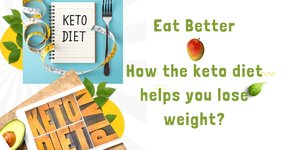saifullaislam
New member

The keto diet is a high-fat, low-carbohydrate diet that helps you burn fat more effectively. When you follow the keto diet, your body enters a state of ketosis, which means that it becomes more efficient at burning fat for energy. As a result, you lose weight more quickly and effectively.
The keto diet works by reducing your intake of carbohydrates, which forces your body to burn fat for energy. When you eat fewer carbs, your body has to turn to other sources of energy, such as fat. This process of burning fat for energy is called ketosis.
Ketosis is a natural metabolic state that occurs when your body doesn’t have enough carbs to burn for energy. When this happens, your body turns to fat for energy. This process of burning fat for energy is what helps you lose weight on the keto diet.
In order to enter ketosis, you need to eat a diet that is very high in fat and very low in carbs. This means that you need to avoid foods like bread, pasta, rice, and potatoes. Instead, you should focus on eating foods like meat, fish, eggs, butter, and oils.
The keto diet is an effective way to lose weight because it forces your body to burn fat for energy.Spam Link Removed , you will quickly see results.
Last edited by a moderator:
